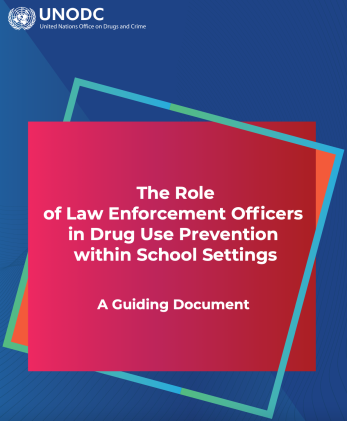
Buscar
Closer to home: An analysis of the state and local impact of the Texas juvenile justice reforms.
Closer to Home: An Analysis of the State and Local Impact of the Texas Juvenile Justice Reforms, which draws on an unprecedented dataset of 1.3 million individual case records spanning eight years, shows youth incarcerated in state-run...
Models of prosecutor-led diversion programs in the United States and beyond.
Abstract
Diversion programs allow criminal justice actors to send defendants out of the court system, compelling them instead to attend treatment programs, participate in educational opportunities, and/or perform community service. These...
Preventing Youth Arrests through Deflection: Best Practices and Recommendations.
This report, Preventing Youth Arrests through Deflection: Best Practices and Recommendations, is a collection of research-informed best-practices from the Commission for effective deflection programs for youth. As a state advisory group...
Juvenile court and contemporary diversion.
Abstract
Research Summary:
The juvenile court was established to help children through the use of punishment and rehabilitation and, in so doing, “save” them from a life of crime and disadvantage. Diversion programs and policies emerged...
Police‐initiated diversion for youth to prevent future delinquent behavior: A systematic review.
Abstract
This Campbell systematic review examines the effects police-initiated diversion programs on delinquent behavior, compared to traditional system processing. The review summarizes evidence from nineteen high-quality studies...
Data-Driven Deflection: A Systems Approach to Reducing Juvenile Arrests.
Executive Summary
Over the past two decades, the United States has made significant strides in adopting evidence-based approaches to juvenile justice. However, America still has relatively high juvenile arrest rates, which are correlated...
Overview of Juvenile Deflection in the United States: A State-by-State Comparison.
Introduction
Over the past few decades, juvenile crime (i.e., “delinquency”), arrests and confinement have begun to decline—a trend that directly correlates with states and localities moving away from overly punitive, “tough on crime”...
Strategies for Postrelease Supervision of Individuals with Serious Mental Illness: Comparing Specialized Community Corrections Officers to Those Not Serving on a Specialized Team
Abstract
Specially trained parole/probation officers (STOs) increasingly manage caseloads of persons with serious mental illness (SMI). Using an online survey, we compared the supervision approaches of 90 STOs to 132 non-STOs who also...
Comparing Public Safety Outcomes for Traditional Probation vs Specialty Mental Health Probation
Key Points
Question Does specialty probation yield better public safety outcomes than traditional probation for people with mental illness?
Findings In this longitudinal study that included 359 probationers with mental illness...
The effects of cognitive behavioral therapy on recidivism among parolees in Central America: evidence from a Honduran experiment
ABSTRACT
Objectives
Cognitive behavioral therapy (CBT) has shown promise as a tool for rehabilitating offenders in the USA and other developed nations. However, little is known about the effectiveness of CBT outside the developed world...
A meta‐analytic review of the efficacy of psychological treatments for violent offenders in correctional and forensic mental health settings.
ABSTRACT
This meta‐analysis examined whether psychological treatments with adult violent offenders in correctional and forensic mental health settings are effective in preventing community recidivism and institutional (hospital/prison)...
The effect of direct interventions for antisocial cognition on recidivism in antisocial populations: a meta-analysis
ABSTRACT
Objectives
A meta-analysis was performed on seven studies in which a treatment program that directly addressed antisocial cognition in offenders was contrasted with a no-treatment or treatment as usual control group.
Methods
Pr...
Treatment Combinations: The Joint Effects of Multiple Evidence-Based Interventions on Recidivism Reduction
ABSTRACT
Evidence-based interventions have been implemented within penal institutions to reduce the propensity of postrelease reoffending across states. Traditional program evaluations explore these interventions and demonstrate treatment...
Criminal Justice Involvement after Release from Prison following Exposure to Community Mental Health Services among People Who Use Illicit Drugs and Have Mental Illness: a Systematic Review
ABSTRACT
Illicit drug use and mental illness are common among people in prison and are associated with higher rates of reoffending and reimprisonment. We conducted a systematic review, searching MEDLINE, Embase, and PsycINFO to January 10...
Treatment completion among justice-involved youth engaged in behavioral health treatment studies in the United States: A systematic review and meta-analysis
Abstract
Justice-involved youth (JIY) have high rates of behavioral health disorders, but few can access, much less complete, treatment in the community. Behavioral health treatment completion among JIY is poorly understood, even within...
Systematic Review: Impact of Juvenile Incarceration. Child Protection and Practice
Abstract
Background
The juvenile justice system was established with the intent of rehabilitation (Fagan & Zimring, 2000). However, despite these intentions, the reality of juvenile incarceration is that it often fails in this...
A Best Practice Approach to Community Reentry From Jails for Inmates With Co-Occurring Disorders: The Apic Model
ABSTRACT
Almost all jail inmates with mental illness will leave correctional settings and return to the community. Inadequate transition planning puts jail inmates who entered the jail in a state of crisis back on the streets in the middle...
An updated systematic review and meta-regression analysis: Mental disorders among adolescents in juvenile detention and correctional facilities.
Abstract
Objective
To synthesize evidence on the prevalence of mental disorders in adolescents in juvenile detention and correctional facilities and examine sources of heterogeneity between studies.
Method
Electronic databases and...
Short term strategies to improve re‐entry of jail populations: expanding and implementing the APIC Model
ABSTRACT
Almost all jail inmates will leave correctional settings and return to the community. Inadequate transition planning puts jail inmates, who entered the jail in a state of crisis, back on the streets in the middle of the same...
Mental Health and Juvenile Justice: A Review of Prevalence, Promising Practices, and Areas for Improvement
This brief reviews the prevalence of mental health issues among youth in the juvenile justice system, including: 1) the types of disorders among youth across juvenile justice settings, 2) the rates of adversity and trauma among these youth...
Contribuye al Intercambio de Conocimientos: Miembros de ISSUP pueden publicar artículos en el Intercambio de Conocimientos – Entra o hazte miembro

